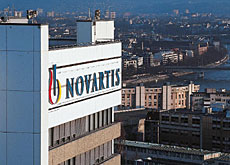Novartis maintains its focus on innovation

The head of the Novartis pharmaceuticals company, Daniel Vasella, makes no secret of the fact that innovation is the key to success.
After announcing record results for the eighth successive year on Thursday, Vasella gave a speech at a news conference in Basel aptly titled “Fuelled by Innovation”.
In the pharmaceutical industry, the rule of thumb seems to be “innovate and thrive; stagnate and you could well take a dive”.
But while analysts’ and investors’ eyes were on the company’s drugs pipeline, Vasella was explaining that generics – copies of drugs that have lost their patent protection – could help drive the innovation process.
“On the one hand the saving of costs frees up funds to be re-allocated to innovative drugs; on the other, knowing that your innovative drug has an end-of-life cycle… forces companies to innovate,” he said.
“And with the innovations we bring, we want to make generics obsolete by bringing products which have a better safety efficacy profile,” he added.
Research and development
Novartis spent $3.5 billion (SFr4.17 billion) on research and development in 2004, up from $3.08 billion in 2003.
“We have 75 products in clinical development. Forty-three of them are new molecular entities,” commented Jörg Reinhardt, the company’s head of pharma development.
“Also in 2004, like in 2003, our pipeline is considered to be among the best in the industry. We have five of the most innovative new products in the industry in our pipeline,” he added.
Much interest centred on the news that Novartis might have the first pill for the treatment of multiple sclerosis, offering sufferers an alternative to injections.
According to Reinhardt, the drug – FTY720 – has shown promising results in trials.
“It could be an excellent drug for this disease… the results were so good that the vast majority of patients wanted to continue treatment in an extension phase of the trial.”
Blockbuster
While analysts believe that FTY may have the potential to become a blockbuster – a drug with annual sales of more than $1 billion – there were mixed feelings about other drugs in the pipeline.
There was some disappointment about the cautious wording surrounding SPP 100, a blood-pressure compound which many have predicted could be worth billions of dollars in annual sales.
But if it were a success, there would certainly be a market for it because at present only about half the patients receiving treatment reach their target blood-pressure levels.
“We have currently one billion [people] suffering from hypertension. This number, by 2025, is going to increase to over 1.5 billion,” said CEO and chairman Vasella.
Cancer treatment
Other compounds for which the company has high hopes are PTK787 for the treatment of colorectal cancer, LAF237 (type 2 diabetes) and QAB149 (once-a-day control of respiratory diseases).
To a layman, the compounds might have rather unwieldy identification names and numbers, but they are familiar jargon at Novartis.
“With that strong pipeline, I think we can be confident about the future. If I look at the company, we have put an enormous effort not just to be financially solid but also up to the highest standards,” commented Vasella.
He added that Novartis was set to outperform the market again this year.
“We believe that on a comparable basis we should again reach record results in 2005. Obviously that’s a prediction we are making very early on in the year, but hopefully we can follow through,” he added.
swissinfo, Robert Brookes in Basel
Novartis was created in 1996 through the merger of the Ciba-Geigy and Sandoz companies, both based in Basel.
It has three divisions: Pharmaceuticals, Sandoz (generics) and Consumer Health.
The company’s name is derived from the Latin novae artes, meaning “new skills”.
Novartis on Thursday reported net profit of $5.767 billion (SFr6.9 billion) in 2004 on sales of $28.247 billion.
Chairman and CEO Daniel Vasella says he is confident that 2005 will bring higher profits.
The company reported that it had a strong pipeline of drugs to generate future sales.

In compliance with the JTI standards
More: SWI swissinfo.ch certified by the Journalism Trust Initiative











You can find an overview of ongoing debates with our journalists here . Please join us!
If you want to start a conversation about a topic raised in this article or want to report factual errors, email us at english@swissinfo.ch.